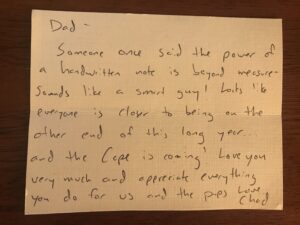
“Too busy is a myth!
People make time for the things and people
that are important to them.”
For the past few months I’ve pursued a personal growth program that focuses on mind, body, and spirit. Participation requires a willingness to push oneself and be pushed by a team, a hunger to pursue challenges that demand growth, a motivation to serve something greater than the individual, and a desire to be an active part of a real community of people driving each other a little harder. In essence I have made a commitment to a more difficult path, and to those who travel it with me.
In his book, Tribe, author Sebastian Junger writes, “Humans don’t mind hardship, in fact they thrive on it; what they mind is not feeling necessary. Modern society has perfected the art of making people not feel necessary. It’s time for that to end.” That comment, in conjunction with a recent assignment, gave me pause to think, what am I doing to make those who are important to me feel necessary? How do I let people know that I value our relationship? In other words, how am I nurturing my relationships?
Relationships are the basis for our social networks and networking. Be they professional or personal, they have and will continue to be an integral part of our lives. From informal meet-and-greet events to more formal business functions, networks have always been the best way to make connections. But they don’t just happen; strong personal and professional networks are the result of a sustained nurturing process that requires an investment of our most precious resource – time!
Have you taken stock of your relationships and network? How invested are you? I think it’s safe to say that we all try to leverage our networks at times, and we are usually ready to reciprocate when called upon, but nurturing a relationship goes deeper than “doing a favor” or “making the introduction”. Nurturing is more personal. It says, “I care about you; I care about our relationship!” How can that be accomplished?
Perhaps the best place to start is by identifying the categories into which your relationships fall. While all are important, some might get a higher priority. My list looks something like this:
- Faith – For me it begins here. This is the relationship we have with our God, Supreme Being, Higher Power and those who guide us.
- Family – This is both immediate and extended. The degree of the extension is up to you!
- Personal Friends – These are the close friends we have made over the years and up to present day. It is a limited group, composed of the individuals who you know will be there for you, and you for them, in a time of crisis.
- Business – These relationships begin in the workplace or are tied to our business dealings. They often begin as collegial , but over time, and with nurturing, these relationships can and have become personal. While the work/business component remains, the relationship is more often identified by both parties as a friendship.
- Religious/Civic/Community/Acquaintances – These relationships result from our involvement in a variety of activities that often serve the greater community and the greater good. WIth cultivation and nurturing, these relationships can blossom into personal friendships.
The nurturing process is simple and can be summed up in one word; Communication! If Covid has taught us anything, it is the importance of using technology as a means of sustaining our relationships. Use your whole technology arsenal of tools for communicating rather than relying on just one mode; texting, chat, messenger, email, and Zoom to name a few. Likewise the variety of social networks (Facebook, Linked-in, Twitter, YouTube, and Instagram) available enable us to easily communicate with those in our network.
Lest we forget, one of the most powerful means of communication is still the handwritten note, as it represents an investment of time and effort. In an era of instantaneous messaging and emails that can be quickly constructed, sent, read and then discarded, the card or note that arrives by mail is often cherished. More than any other form of communication, it sends a message that the relationship is valued! Regardless of the message included, taking the time to prepare and send a handwritten note signals the recipient that they are on our mind, they are important, and we care about their well-being.
What is the status of your relationships and networks? How well will they serve you as we emerge from a year of social distancing? As you reflect on this past year, is there someone who was there for you, had your back, or helped you through a tough time? Why not reach out tomorrow, express your gratitude and let them know you value your relationship with them?
